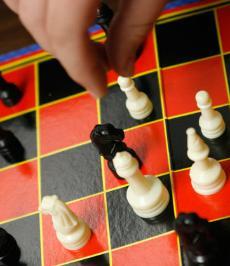By Kevin Hudec

Photo Illustration by Khai Le (Photo Illustration by Khai Le)
By Kevin Hudec
“At least it can’t enjoy the victory,” said Garry Kasparov after his first defeat in his infamous Chess match against the computer Deep Blue in 1996.
Kasparov, like many other world champions of chess, has faced off against computers.
However, he is the first reigning world champion to lose to a computer.
Deep Blue was built by IBM specifically for playing chess against Kasparov and no other opponent and was retired after only two matches.
The first match saw the machine defeat Kasparov in the first game and in the remaining five games lost three times and stalemated twice.
Kasparov was defeated by an updated version of Deep Blue in 1997.
Since that match every major meeting between a computer and a Grandmaster of chess has ended in a tie or a computer victory.
This history shows why, despite many factors, chess can not be considered a sport.
Many people argue that chess is a sport and should even be included in the Olympics because of the dedication, skill, strategy and years of practice that it takes.
In fact, most people will use those aspects to define why they enjoy watching their favorite sport.
Baseball fans will talk about the dedication to the game required to endure such a long season and forget about the fact that most chess masters started honing their skills during childhood.
Basketball fans will talk about the amount of skill that certain players have when they effortlessly leap into the air and dunk the ball through the hoop and forget about the skill required to know where to move a pawn after an aggressive gambit by an opponent.
Football fans will talk about the myriads of formations, plays, and strategies that can go into every aspect of each game and forget that the strategies used in football are only the tip of the iceberg compared to the strategies used in chess.
Every sport takes years of practice to master and chess is no different with many players not understanding the full potential of a piece until many years into competitive play.
Yet, chess is missing the one aspect that defines a sport in most people’s minds. Athleticism.
Professional athletes have to train their bodies to be able to push past normal limits; chess players have to be able to physically perform even less than a six year old child.
Chess enthusiasts want to declare the game a sport when there is so little physical activity that a computer is the best player in the world.
Chess is even more advanced than any sport in many ways, however, when it comes down to it; Chess is still just a board game.






